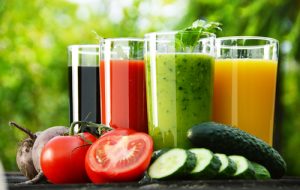
This is where detoxing comes in, promising a healthier and refreshed you. Whether through juices, supplements or some other liquid concoction you need to drink for three days, detoxing has become a celebrity-endorsed sure-fire way to get you back to where you started before all the overindulging.
But is detoxing really the answer? Can only drinking fruit and vegetable juices for days on end reset our bodies?
The detox trend
Everywhere you look now some form of detox is being promoted and recommended – yet health experts debate whether detoxing is necessary or even works. But what should or shouldn’t we believe?
RELATED READING: Why washing your hands is harming this organ
First and foremost, a detox is a means through diet or supplementation to rid the body of chemicals and toxins we ingest on a daily basis. Some of these toxins come from pollution, water, stress and even our diet.
A cleanse often is suggested to eliminate as much of these toxins as possible for optimal health and function. A cleanse could mean changing your diet, fasting, or purchasing a detox aid, like a powder or capsules. Some detoxes go so far as to recommend a colon cleanse through enemas – a means of injecting gas or liquid in the colon to clean it out.
Depending on the route you choose, detoxing can be hard on your body, making you feel hungry, tired, unfocused and even dizzy. All symptoms which don’t sound very enjoyable. Once completed, though, you may feel energized, less stressed and almost brand-new. But is it the detox itself making you feel this way or the change from unhealthy to healthy habits?
The Mayo Clinic suggests that when people embark on a detox they feel better once they’ve completed it because they have removed junk food, alcohol and other unhealthy options from their lives. Can we really applaud detoxing for making us feel better, or should we commend it for its ability to push us into healthier living?
Your body detoxes naturally
Our bodies are equipped with their very own detox system: Kidneys and the liver. These organs work to remove waste naturally, without added supplements or juices. The liver, the body’s largest organ, is responsible for removing toxins, as well as converting nutrients for use by the body. Anything that enters your body will, at some point, get processed through your liver.
RELATED READING: This common indulgence poison for many seniors
For your liver to detox, it will first break down the waste and toxins and turn them into bile so they can leave the body safely. Everything from your diet and the environment will be broken down, converted and shipped out, all with the help of your liver. However, this doesn’t mean that your liver doesn’t need some assistance.
Give your liver some TLC
As a rule, avoid smoking and too much sugar and alcohol. These substances can be quite heavy on your liver and slow it down. If your liver is weighted down by toxins, your immune system can weaken and you can easily get sick.
A healthy lifestyle and diet can put less stress on your liver as a whole. Try incorporating foods like garlic, turmeric, artichokes and citrus foods that help with the production of bile and detoxification by adding essential enzymes your liver needs to break down toxins.
Although a formal detox plan or juice fast may not be necessary, take steps to ensure your body’s natural detox system is working effectively. Consult your doctor about the approach that’s best for you – a few changes to your diet and routine may be all you need to promote healthy, natural detoxing.